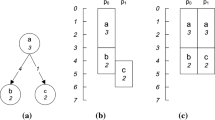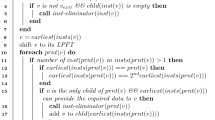Abstract
Fault tolerance in parallel systems can be achieved by duplicating task executions onto several processing units, so in case one processing unit (PU) fails, the task can continue executing on another unit. Duplicating task execution affects the performance of the system in fault-free and fault cases, and its energy consumption. Currently, there are no tools for properly handling the three-variable optimization problem: Performance \(\leftrightarrow \) Fault Tolerance \(\leftrightarrow \) Energy Consumption, and no facilities for integrating it into an actual system. We present a fault-tolerant runtime system (called RUPS) for user defined schedules, in which the user can give their preferences about the trade-off between performance, energy and fault tolerance. We present an approach for determining the best trade-off for modern multicore architectures and we test RUPS on a real system to verify the accuracy of our approach itself.
Access this chapter
Tax calculation will be finalised at checkout
Purchases are for personal use only
Similar content being viewed by others
Notes
- 1.
For a given voltage there is a maximum frequency and for a desired frequency there is a minimum voltage required.
References
Alam, B., Kumar, A.: Fault tolerance issues in real time systems with energy minimization. Int. J. Inf. Comput. Technol. 3(10), 1001–1008 (2013)
Albers, S.: Energy-efficient algorithms. Commun. ACM 53(5), 86–96 (2010)
Aupy, G., Benoit, A., Renaud-Goud, P., Robert, Y.: Energy-aware algorithms for task graph scheduling, replica placement and checkpoint strategies. In: Khan, S., Zomaya, A. (eds.) Handbook on Data Centers, pp. 37–80. Springer, New York (2015). https://doi.org/10.1007/978-1-4939-2092-1_2
Basmadjian, R., de Meer, H.: Evaluating and modeling power consumption of multi-core processors. In: Proceedings of the 3rd International Conference on Future Systems: Where Energy, Computing and Communication Meet (e-Energy 2012), pp. 1–10 (2012)
Bland, W.: User level failure mitigation in MPI. In: Caragiannis, I., Alexander, M., Badia, R.M., Cannataro, M., Costan, A., Danelutto, M., Desprez, F., Krammer, B., Sahuquillo, J., Scott, S.L., Weidendorfer, J. (eds.) Euro-Par 2012. LNCS, vol. 7640, pp. 499–504. Springer, Heidelberg (2013). https://doi.org/10.1007/978-3-642-36949-0_57
Cai, Y., Reddy, S.M., Al-Hashimi, B.M.: Reducing the energy consumption in fault-tolerant distributed embedded systems with time-constraint. In: 8th International Symposium on Quality Electronic Design (ISQED 2007), pp. 368–373 (2007)
Cichowski, P., Keller, J., Kessler, C.: Modelling power consumption of the Intel SCC. In: Proceedings of the 6th Many-Core Applications Research Community Symposium (MARC 2012), pp. 46–51 (2012)
Eitschberger, P., Keller, J.: Efficient and fault-tolerant static scheduling for grids. In: Proceedings of the 14th IEEE International Workshop on Parallel and Distributed Scientific and Engineering Computing (PDSEC 2013), pp. 1439–1448 (2013)
Eitschberger, P., Keller, J.: Energy-efficient and fault-tolerant taskgraph scheduling for manycores and grids. In: an Mey, D., et al. (eds.) Euro-Par 2013. LNCS, vol. 8374, pp. 769–778. Springer, Heidelberg (2014). https://doi.org/10.1007/978-3-642-54420-0_75
Fechner, B., Hönig, U., Keller, J., Schiffmann, W.: Fault-tolerant static scheduling for grids. In: Proceedings of the 13th IEEE Workshop on Dependable Parallel, Distributed and Network-Centric Systems (DPDNS 2008), pp. 1–6 (2008)
Goel, B., McKee, S.A.: A methodology for modeling dynamic and static power consumption for multicore processors. In: Proceedings of the 30th IEEE International Parallel and Distributed Processing Symposium (IPDPS 2016), pp. 273–282 (2016)
Hashimoto, K., Tsuchiya, T., Kikuno, T.: Effective scheduling of duplicated tasks for fault tolerance in multiprocessor systems. IEICE Trans. Inf. Syst. 85, 525–534 (2002)
Hongxia, W., Xin, Q.: Dynamic replication of fault-tolerant scheduling algorithm. Open Cybern. Syst. J. 9, 2670–2676 (2015)
Hönig, U., Schiffmann, W.: A comprehensive test bench for the evaluation of scheduling heuristics. In: Proceedings 16th IASTED International Conference on Parallel and Distributed Computing and Systems (PDCS 2004), pp. 437–442 (2004)
Kianzad, V., Bhattacharyya, S., Ou, G.: CASPER: an integrated energy-driven approach for task graph scheduling on distributed embedded systems. In: Proceedings of the 16th IEEE International Conference on Application-Specific Systems, Architectures and Processors (ASAP 2005) (2005)
Pruhs, K., van Stee, R., Uthaisombut, P.: Speed scaling of tasks with precedence constraints. Theory Comput. Syst. 43(1), 67–80 (2008)
Singh, J., Auluck, N.: DVFS and duplication based scheduling for optimizing power and performance in heterogeneous multiprocessors. In: Proceedings of the High Performance Computing Symposium (HPC 2014), pp. 22:1–22:8 (2014)
Takouna, I., Dawoud, W., Meinel, C.: Accurate mutlicore processor power models for power-aware resource management. In: Proceedings of the 9th IEEE International Conference on Dependable, Autonomic and Secure Computing (DASC 2011), pp. 419–426 (2011)
Tosun, S., Mansouri, N., Kandemir, M., Ozturk, O.: An ILP formulation for task scheduling on heterogeneous chip multiprocessors. In: Levi, A., Savaş, E., Yenigün, H., Balcısoy, S., Saygın, Y. (eds.) ISCIS 2006. LNCS, vol. 4263, pp. 267–276. Springer, Heidelberg (2006). https://doi.org/10.1007/11902140_30
Zhao, L., Ren, Y., Xiang, Y., Sakurai, K.: Fault-tolerant scheduling with dynamic number of replicas in heterogeneous systems. In: 12th IEEE International Conference on High Performance Computing and Communications (HPCC), pp. 434–441 (2010)
Author information
Authors and Affiliations
Corresponding author
Editor information
Editors and Affiliations
Rights and permissions
Copyright information
© 2018 Springer International Publishing AG, part of Springer Nature
About this paper
Cite this paper
Eitschberger, P., Holmbacka, S., Keller, J. (2018). Trade-Off Between Performance, Fault Tolerance and Energy Consumption in Duplication-Based Taskgraph Scheduling. In: Berekovic, M., Buchty, R., Hamann, H., Koch, D., Pionteck, T. (eds) Architecture of Computing Systems – ARCS 2018. ARCS 2018. Lecture Notes in Computer Science(), vol 10793. Springer, Cham. https://doi.org/10.1007/978-3-319-77610-1_1
Download citation
DOI: https://doi.org/10.1007/978-3-319-77610-1_1
Published:
Publisher Name: Springer, Cham
Print ISBN: 978-3-319-77609-5
Online ISBN: 978-3-319-77610-1
eBook Packages: Computer ScienceComputer Science (R0)




